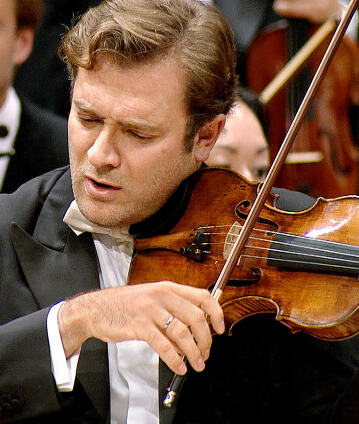Matthias Pintscher and Renaud Capuçon

Matthias Pintscher is considered not only one of the preeminent composers of our day, but also among its most exciting conductors, particularly since being appointed head of the famous Ensemble intercontemporain in 2013. At this concert from September 2015, he makes his debut with the Berliner Philharmoniker. The programme includes works by Fauré, Schoenberg and Debussy, as well as Pintscher’s own mar’eh with violinist Renaud Capuçon as the soloist.
“I believed I had found ways to form and use themes and melodies which were understandable, characteristic, original and expressive despite the expanded harmonic system we had inherited from Wagner,” Arnold Schoenberg recalled in 1937 about the origins of his First Chamber Symphony from the year 1906. He admitted, however: “It was at once a beautiful dream and a disappointing mistake.” But the composer soon abandoned the decision at the time to tackle a second chamber symphony and do it better in favour of other works. The project remained in the drawer for 30 years until Schoenberg, on the suggestion of conductor Fritz Stiedry, who had followed the composer in fleeing the National Socialists into American exile in 1937, began to work on the Second Chamber Symphony again. Not an easy task, as it transpired: “I spend most of the time trying to discover ‘What did the author mean here?’” Schoenberg wrote to Stiedry while studying his own composition sketches in the fall of 1939: “My style has now become very consolidated ...”
Matthias Pintscher will no doubt still know quite precisely what he “meant” with his violin concerto Mar’eh when he conducts performances of the work composed in 2011; it is played in this concert by the French star violinist Renaud Capuçon. The composer had already given us a tip: “‘Mar’eh’ means face, sign. The Hebrew word can also mean the aura of a face, a beautiful vision, something wonderful which suddenly appears before you.” The beautiful appearance of a young woman leads to a drama of relationships with a fatal outcome in Maurice Maeterlinck’s drama Pelléas et Mélisande, first performed in Paris in 1893. Four years after Gabriel Fauré composed incidental music for Pelléas et Mélisande in 1898 which brilliantly captured the soft (under-)tones of Maeterlinck’s language, a composer dared to set the drama to music: Claude Debussy, is represented in this concert programme with La Mer, an orchestral hymn to the Atlantic.
© 2015 Berlin Phil Media GmbH
Related interview
Artists
Our recommendations
- Ligeti’s Violin Concerto with Renaud Capuçon and David Robertson
- “Late Night” concert with Matthias Pintscher and the Scharoun Ensemble
- Matthias Pintscher conducts Ligeti, Zimmermann and Martinů
- A “Finnish Evening” with Mikko Franck
- Season opening 2018: Kirill Petrenko conducts Beethoven and Strauss
- Andris Nelsons and Baiba Skride